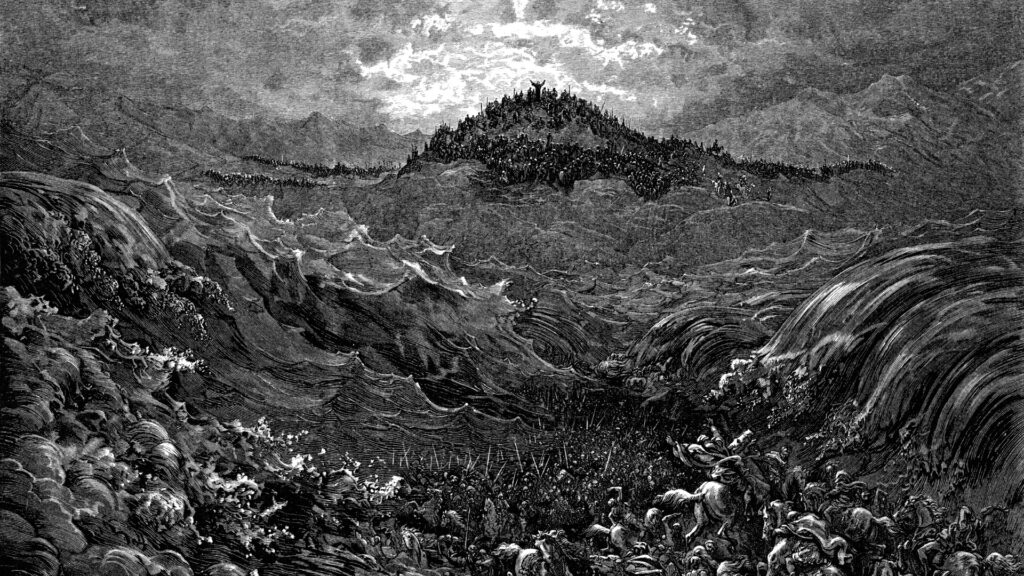Exodus
Stand Firm
Read This Week: Exodus 14
Moses answered the people, “Do not be afraid. Stand firm and you will see the deliverance the Lord will bring you today. The Egyptians you see today you will never see again. The Lord will fight for you; you need only to be still.” – Exodus 14:13-15 NIV
Exodus 14 is the one everyone knows. It is one of the most famous parts of the entire narrative. There have been countless commentaries on it in spiritual, historical, and even archeological circles by people of faith and those skeptical of God’s existence. This chapter embodies the book’s very name – the Exodus – as it depicts the Israelites’ escape from Egypt and their miraculous crossing of the Red Sea. It highlights the immutable sovereignty and extraordinary power of God, the faith of his people in the face of harrowing uncertainty, and how divine intervention is active in everyday life.
As we have read and studied to this point, the Israelites have been enslaved in Egypt for multiple generations. Their cries for deliverance were answered by God, who called on and raised up Moses to lead them out of the bondage that oppressed them for so long. After a series of plagues that demonstrated the Lord’s might, with the catalyst being the death of his own firstborn son, Pharaoh finally lets them go. However, as the children of Israel approach the Red Sea, Pharaoh reverts to a hardened heart, as he had so many times. He then summons his army to pursue and kill them before their journey goes beyond the desert. As a result, this historic and pivotal moment sets the stage for one of the most incredible displays of faith and divine power.
As the Israelites stand before the Red Sea, with the Egyptian army closing in, they become paralyzed by sudden fear and despair. They cry out to Moses in pain and even express that they should have stayed in Egypt. This reaction is a reminder of our human nature. We tend to forget God’s promises and assurances of who He is when we are anxious, unsure, and confronted with seemingly insurmountable obstacles. When we encounter overwhelming challenges, it’s essential to acknowledge our fears. However, instead of succumbing to despair, we can place our faith in God’s word, focus on His possibilities for our lives, and seek guidance from the Holy Spirit to stay resolved and on the mission.
But Moses, facing intense criticism and fear from the people, displayed remarkable courage and faith. He encouraged the Israelites, saying, Do not be afraid. Stand firm, and you will see the deliverance the Lord will bring you today (v.13). His confidence in God’s plan was a rallying cry for the people and propelled them to keep going when it seemed hopeless. This stand that Moses takes as the Egyptian army bore down on them is what Spirit-led, effective leadership often requires. It is the unwavering faith and ability to inspire others during difficult times because we trust the Lord and what He says He will do. Believers are called to communicate hope and vision, helping those around us to rise above our fears and to engage our faith in the Almighty. A firm stand is sometimes needed to claim all God has for us on the way.
As the Israelites stood strong, God instructed Moses to stretch out his hand over the waters. Then, the sea parts in an awesome, miraculous display of Yahweh’s power, allowing the Israelites to cross on dry ground and defeat the Egyptians in a devastating water event. This moment shows us that while we must have and act in faith, God’s intervention and assistance often come when we least expect it. Taking a stand and trusting in Jesus can lead to extraordinary outcomes. When faced with all the things this fallen world has to offer, we can take steps of faith and move where God works, knowing that we are not alone.
After they experienced the freedom of crossing the Red Sea and understanding that God would make good on His promises to them, the Israelites sang a song of praise to God for their deliverance in a beautiful moment. This act of worship is essential in acknowledging their journey and the miracles they had witnessed. Recognizing God’s goodness and provision as we celebrate victories, big or small is vital for our relationship and emotional and spiritual well-being with the Father and others. This approach of worship and gratitude allows us to take a spiritual stand and helps us remember what the Lord says and what we learned, strengthening our faith for the future and the challenges that may lie ahead.
It is important to remember that Exodus 14 is not just a historical account but a profound spiritual story that resonates with our modern struggles and victories. As we navigate our own Red Seas in life, we should trust Jesus and allow Him to fuel our courage in leadership and unwavering faith in the face of adversity. By doing so, we can trust that our journeys will lead us to a place of freedom and fulfillment, just as the Israelites discovered on their path to the Promised Land.
Honoring Wisdom
Read This Week: Exodus 13
The Lord said to Moses, “Consecrate to me every firstborn male. The first offspring of every womb among the Israelites belongs to me, whether human or animal.” Then Moses said to the people, “Commemorate this day, the day you came out of Egypt, out of the land of slavery, because the Lord brought you out of it with a mighty hand. – Exodus 13:1-3 NIV
Exodus 13 stands out among its chapters with instructions and symbols that hold relevance far beyond the immediate context. This chapter is pivotal as it lays the foundation for the practice of consecration and remembrance, themes that can offer practical insights for us as modern-day believers.
In verses 1-2, the Bible says the Lord told Moses to consecrate every firstborn male. The first offspring of every womb among the Israelites belongs to me, whether human or animal. As we will see going forward in the Old Testament, this Israelite spiritual practice was to sanctify the firstborn as a symbolic act of acknowledging God’s sovereignty and ownership over life. This act of worship was rooted in the Passover event when God spared the firstborn of Israel while striking down the firstborn of Egypt. For us, consecration can be understood as dedicating our best efforts and first fruits to God. Whether it’s dedicating time, resources, or energy, prioritizing what is most important can build a sense of purpose and gratitude. For instance, starting our day by reading the Word, praying, and meditating or dedicating the first portion of our income to the mission of the gospel can be ways to apply this principle.
Verses 6-7 describe the Feast of Unleavened Bread. This observance was a time for the Israelites to remember their hasty departure from Egypt. The absence of leaven symbolized purity and a break from their past lives. In our lives, this can be seen as a call to rid ourselves of leaven or negative influences regularly. This discipline could mean seeking the Holy Spirit for things to take out of our lives that are unnecessary, simplifying our lives by decluttering our hearts, or reflecting on and releasing unhealthy habits and attitudes. Additionally, setting aside time for reflection and celebration of personal milestones can serve as a way to remember and appreciate the progress made.
Verse 9 talks about the physical reminders of God’s commandments worn by Jewish people during prayer. This practice was intended to keep the divine laws constantly in mind. In a broader sense, this can translate to finding meaningful ways to keep God’s principles, core values, and desires at the forefront of our daily lives. Whether through visual reminders like sticky notes with Scripture, spiritual and personal affirmations, or setting regular reminders on our devices for Bible reading, reflection, and goal-checking, these tools help keep our minds and hearts on the things of Christ, His mission, and our calling.
The redemption of the firstborn donkey in verse 13 as an unclean animal, and the requirement to sacrifice a lamb in its place implicates the value of purity and redemption that we should emulate in our lives. This part illustrates the principle of substitutionary atonement, symbolizing that some things must be redeemed or transformed rather than discarded, just as Jesus saw us and made way for salvation through His sacrifice. He satisfied God’s wrath and allowed us to stand before God as justified by faith in His finished work on the cross. This can inspire us to find value and potential in areas of our lives that may seem problematic or useless. Rather than discarding them, we can ask God to redeem them and transform them into opportunities for growth and learning. We can go to the Lord and address sin issues, personal flaws, and shortcomings and to find solutions. He is the Father who brings beauty from ashes.
By reflecting and thinking about the themes in this chapter of consecration, remembrance, symbolism, redemption, and teaching, we are empowered by God to seek spiritual and practical ways to apply these ancient teachings of Exodus to our modern lives. Through such applications, we not only honor the wisdom of God’s people but also enrich our own lives with purpose, mindfulness, and continuity.
Judgment and Mercy
Read This Week: Exodus 12
During the night Pharaoh summoned Moses and Aaron and said, “Up! Leave my people, you and the Israelites! Go, worship the Lord as you have requested. Take your flocks and herds, as you have said, and go. And also bless me.” The Egyptians urged the people to hurry and leave the country. “For otherwise,” they said, “we will all die!” – Exodus 12:31-33 NIV
Exodus 12 shows us the tension between divine judgment and mercy leading up to the departure of God’s people from bondage. This section describes how the Lord ultimately delivers His holy verdict upon Egypt, culminating in the excruciating death of every firstborn male, from Pharaoh’s own son to the prisoner in the dungeon. This act of judgment is really the culmination of the severity of Pharaoh’s disobedience and the consequence of rejecting God’s will.
Yet, in the middle of this judgment, the Scriptures show us a profound expression of God’s divine mercy. The Israelites are spared through the blood of the Passover lamb, which marks their homes and signifies their covenantal relationship with Yahweh. It serves as their mark of grace. This juxtaposition of judgment and mercy points to a deeper theological truth: God’s judgment is righteous, but His mercy offers redemption and salvation. The Passover lamb marked the Israelites’ doorposts and became a central symbol of salvation. The blood signifies protection and deliverance from death. This act foreshadows the sacrificial approach established later in the Law. It indicates the ultimate sacrifice of Christ, often called the Lamb of God in the New Testament. Just as the Passover lamb’s blood shielded the Israelites, the sacrifice of Jesus is seen as providing redemption from sin and eternal death.
Exodus 12 institutes the Passover as a lasting ordinance, requiring that future generations remember and celebrate this event. This call to remember is more than a mere ritual; it’s a call to live in constant awareness of God’s deliverance and faithfulness. Observing Passover is a way for the Israelites to maintain their identity and covenant relationship with God. This principle of remembrance underscores the importance of spiritual practice and nurturing of faith and connection to community.
In modern days, Passover serves as a reminder of God’s past acts of salvation and deliverance. Similarly, Christian practices such as Communion can be seen as a continuation of this remembrance. Engaging in regular observances helps to ground believers in their faith, providing tangible ways to experience and express their spiritual commitments. We are always invited to reflect on the themes of judgment and redemption in our faith. Just as the Israelites were spared through the blood of the lamb, believers are asked to reflect on their own spiritual journeys and experiences of God’s grace through Jesus. This observance can prompt personal repentance, renewed commitment, and gratitude for the ways in which divine mercy has been experienced in one’s own life.
Passover was not just an individual celebration but a communal one. It was an event that united the Israelites in their shared experience of freedom. Similarly, the family of God today can draw inspiration from this collective aspect of worship. Whether through our gatherings, group Bible study, or shared acts of service, building a sense of spiritual unity, generosity, and mutual support mirrors the communal dimension of the Passover. That is why the Christian community and coming together to worship God is so essential in the believer’s life.
The story of this chapter is deeply tied to the theme of our series and the journey to freedom from oppression for Israelites. In a broader context, it calls for awareness and action against injustice and standing up for God’s Word. For us, this can translate into active engagement in the mission of the gospel and the family of God. It calls for fellowship in Christ and the unbreakable bond of the Holy Spirit that brings us together. It also inspires us to advocate for the marginalized and work towards personal and spiritual freedom and equality in our various aspects and circles of influence. As the redeemed and freed people, we are responsible for telling others how they can experience salvation and liberty from the bondage of sin and pain.
This commitment to our calling might involve leaving our comfort zones, setting aside regular times for reflection and prayer, reading the Word, and serving others, which honors the Lord and His goodness to us in the past. God’s righteous judgment and mercy are both a reality and should ensure that our lives and actions align with the values and teachings derived from such sacred memories of His holiness and grace to us.
Preparation
Read This Week: Exodus 11
The Lord had said to Moses, “Pharaoh will refuse to listen to you—so that my wonders may be multiplied in Egypt.” Moses and Aaron performed all these wonders before Pharaoh, but the Lord hardened Pharaoh’s heart, and he would not let the Israelites go out of his country. – Exodus 11:9-10 NIV
Exodus 11 is often overshadowed by the dramatic climax of the final plague, but valuable lessons for personal growth, preparedness, and resilience lie in it. This section leads up to the last and most devastating plague – the death of the firstborn in Egypt. It’s a pivotal moment in the biblical narrative with profound implications for our lives today.
This chapter serves as the backdrop to the final plague, giving the Israelites and the Egyptians a preview of what will come. Preparation is a recurring theme in this chapter. For the Israelites, it’s a moment to prepare for their imminent departure from slavery. This climactic moment highlights the importance of being prepared for significant changes or challenges in our lives. Whether it’s preparing for a career transition, a personal issue, or a major decision, taking time to plan and prepare can make a significant difference in how we handle these changes. Pharoah was unprepared for what he was about to face, but Moses and Aaron had God’s directive as their directional force. That is why we must seek the Lord and the guidance of the Holy Spirit in our preparation, no matter what we face or what is on the horizon.
Verses 4-6 details Moses’ powerful message about the forthcoming plague and emphasizes his role as a leader and a spokesman for God in a pivotal moment. His leadership is marked by clarity, conviction, and courage, as seen in the previous chapters. Whether in the workplace, at home, or in the community, we have the responsibility to communicate effectively and lead with integrity, especially during times of crisis and when God calls us to do something on mission.
This section of Scripture encourages us to embrace the calling and path God has for us despite the seeming barriers or opposition that we may encounter. This principle is especially true if we are in a leadership role. We must focus on clear communication from the Word and confidently making decisions with the Spirit’s help. When we lead with integrity and empathy, we inspire trust and respect from those around us and glorify God.
Once again, we see the gravity of the consequences of Pharaoh’s decisions. The final plague is a direct result of his hardened heart and refusal to free the Israelites. This serves as a reminder that our actions and decisions can have far-reaching consequences, affecting not only ourselves but those around us. Pharoah’s actions and rebellion give us an impetus to reflect on the decisions we make and consider their potential impact on the kingdom and others. With God’s help, we can make choices that are considerate of others and mindful of long-term, eternal outcomes.
We also see in this chapter that the approaching departure of the Israelites marks a significant change for them. They are moving from slavery to a journey of freedom, a dramatic shift that requires them to adapt to a new way of life – God’s way. Embracing change can be challenging but often necessary for growth and progress. When faced with change, we should trust the Lord and focus on its opportunities rather than the uncertainties. Embracing a positive, godly mindset can help us adapt more efficiently and make the most of new situations, even if they are scary or difficult.
While leading up to the climactic events of the final plague, this intense passage offers valuable lessons that extend beyond its historical context to theological and practical implications. By focusing on preparation, attentiveness to God’s will, and faith, we can draw valuable insights that apply to our daily lives. We are urged through the Scriptures to reflect on these principles and consider how they can inform our actions and mindset as we navigate our own challenges and opportunities. We never have the excuse of being unprepared, as God faithfully equips us with everything we need to live and join Him where He is moving.
Be Open
Read This Week: Exodus 10
So Moses and Aaron went to Pharaoh and said to him, “This is what the Lord, the God of the Hebrews, says: ‘How long will you refuse to humble yourself before me? Let my people go, so that they may worship me. If you refuse to let them go, I will bring locusts into your country tomorrow. – Exodus 10:3-4 NIV
Exodus 10 vividly portrays the eighth and ninth plagues God inflicts upon Egypt in His power: locusts and darkness. These two plagues demonstrate the might of God and the continuous, unyielding stubbornness of Pharaoh’s heart. Verses 1-20 outline the eighth plague of locusts. God instructs Moses to go to Pharaoh and demand the release of the Israelites once again and to warn Pharaoh that if he refuses, there will be a devastating plague of locusts that will cover the land and destroy everything left after the previous hailstorm.
Initially, Pharaoh’s officials plead with him to let the Israelites go. Pharaoh agrees to negotiate but is ultimately insincere about his intentions. After the locusts devastate the land, Pharaoh asks for relief but then hardens his heart once more when the locusts are removed. These repeated scenarios with the Egyptian ruler defy logic and reason in every way. His pride, ego, and thirst for control continue to have devastating consequences for his country and his people.
Verses 21-29 tell us about the ominous plague of darkness as God commands Moses to stretch out his hand toward the sky, bringing about three days of total darkness over Egypt. This darkness is so profound that it can be felt. People can sense and feel the heaviness of the lack of light. At this point, Pharaoh offers to let the Israelites go but demands that they leave their livestock behind. Moses refuses, stating that they need their animals for sacrifices. Pharaoh’s offer is rejected, and the darkness is lifted. Despite this devastating reality, Pharaoh continued to resist and would not give up control.
Pharaoh’s repeated refusal to heed God’s warnings highlights a critical aspect of human nature: stubbornness. Despite experiencing the devastating consequences of his defiance, Pharaoh repeatedly refuses to relent, showcasing how pride and resistance can lead to one’s downfall. This constant behavior by Pharoah is an excellent reflection for us as it prompts our hearts to examine areas where we might resist the Holy Spirit or necessary changes in our lives. It should cause us to look at any patterns, habits, or attitudes that must be addressed. This story should motivate us to check our submission level to God and seek personal growth and openness to change.
Like in Egypt during this time, we live in moments of confusion and moral ambiguity. We must be mindful to seek guidance from God’s Word, prayer, or counsel from the family of God. Just as the people felt darkness in Egypt, our personal and collective struggles can be opportunities to seek greater clarity and understanding. We must diligently seek light and clarity in times of chaos and spiritual darkness. It encourages turning to faith and divine guidance when faced with moral and existential issues.
Moses demonstrates faith and persistence in holding to and delivering God’s messages despite his own fear, reluctance, and inability to understand at times. He pleads with God on behalf of the Israelites and shows us the importance of strong, faithful leadership and intercessory prayer in the face of resistance and opposition. May we do likewise in our daily lives – resist the darkness and seek the way of Christ in troubled times.
We must not be spiritually stubborn but look inward to make sure our hearts are submissive, open, and clear about what the Lord wants for us. Like Moses, may He give us the humility, steadfastness, and consistency to speak His truth and gospel amid many confusing messages.
Hard Hearts
Read This Week: Exodus 9
Then Moses left Pharaoh and went out of the city. He spread out his hands toward the Lord; the thunder and hail stopped, and the rain no longer poured down on the land. When Pharaoh saw that the rain and hail and thunder had stopped, he sinned again: He and his officials hardened their hearts. So Pharaoh’s heart was hard and he would not let the Israelites go, just as the Lord had said through Moses. – Exodus 9:33-35 NIV
Exodus 9 continues the account of the plagues afflicting Egypt as God seeks to convince Pharaoh to release the Israelites from slavery. In this chapter, we witness the fifth and sixth plagues: the plague of the livestock and the plague of boils. At this juncture, it appears that nothing will sway him to end the oppression of God’s people. His heart seems so hardened by his ego and resistance to any authority apart from himself.
Yet, Exodus continues to reveal the theme of God’s sovereignty. The plagues are not haphazard; they are purposeful demonstrations of divine power over the natural and supernatural realms and figures. Each plague is a profound testament to the one true God’s authority over all creation, invoking a sense of awe and reverence that causes us to worship Him.
In verses 1-7, God announces that all Egyptian livestock will be struck with severe pestilence, but the Israelites’ animals will be spared. This plague is a direct attack on Egypt’s economy and agricultural base, emphasizing the power of God over the gods of the Egyptians, particularly Hathor, the goddess of fertility and protector of cattle. Then, in the following five verses, Moses and Aaron are instructed to take soot from a furnace and scatter it into the air. This soot turns into fine dust that causes painful boils to break out on the people and animals. This plague targets the health and hygiene of the Egyptians, further demonstrating God’s supremacy over their deities and conditions.
Pharaoh’s response to these plagues is significant. He and his officials continue to have hard hearts. Despite the devastation, he remains stubborn and refuses to let the Israelites go, although he starts to crack. He begins to show signs of distress, inconsistency, and mental fatigue. Despite witnessing these miracles and suffering, Pharaoh’s unbelievable obstinacy shows how difficult it is to overcome the depth of human pride and resistance to God. We all would like to believe that we are not capable of this type of disobedience, but we have to be mindful that our brokenness in the flesh is
In our study, we keep seeing that suffering is part of a larger narrative in the story of God and man. In our lives, adversity can bring about growth and transformation that reflect and cause us to reconsider our values and actions. It pushes us toward the heart of Father God and to the guidance of the Holy Spirit when we reach the limits of our capacity. But it shouldn’t take that long. We should avoid behaving like Pharoah and not harden our hearts during times of trial but be humble and submissive to what the Lord wants to teach us.
Pharaoh’s hardened heart demonstrates the impact of personal choices on the broader community. Just as his decisions led to widespread suffering, our choices can influence our lives and those around us. We don’t live in a vacuum, and the outflow of our hearts, whether hardened or open, can affect more than we think. That is why it is essential for us to be pliable and receptive to God’s leading in our behavior and decisions.
Whether viewed through a theological lens or a practical one, the story of Exodus 9 challenges us to consider the conditions of our hearts at all times and how we align our lives with biblical principles. To protect our hearts from the hardening that can happen from our struggles, frustrations, and issues this world brings. Proverbs 4:23 tells us to guard our hearts because from it, flows the wellsprings of life and we would be prudent to follow that wisdom.
Troubles
Read This Week: Exodus 8
Then the Lord said to Moses, “Go to Pharaoh and say to him, ‘This is what the Lord says: Let my people go, so that they may worship me. If you refuse to let them go, I will send a plague of frogs on your whole country.
– Exodus 8:1-2 NIV
As a continuation of the last chapter’s showdown between Pharoah and Moses, Exodus 8 details three of the ten plagues God inflicted upon Egypt to persuade the Egyptian ruler to release the Israelites. This chapter outlines the skin-crawling details of the plagues of the Frogs, Gnats, and Flies. These troubles are not just historical events in the annals of Jewish history; they carry profound spiritual and practical lessons that resonate with us as believers today.
Verses 1-15 unveil the plague, where God commands Moses to confront Pharaoh and demand the release of the Israelites. When Pharaoh refuses, God unleashes a swarm of frogs over Egypt. These frogs invade every aspect of life, covering the land and entering houses, beds, and kitchens. Frogs, typically seen as harmless creatures, become instruments of judgment. God can use even the most unlikely elements of creation to accomplish His purposes. In Egyptian culture, frogs were associated with a goddess of fertility and life. By turning this symbol into a curse, God shows the pointlessness of relying on idols or false gods.
Following the frogs, God instructs Moses to strike the dust of the earth, turning it into gnats (or lice) that infest both people and animals. This third plague is notable because the Egyptian magicians, who were able to replicate the previous plagues, could not duplicate this one. They acknowledge that this is the finger of God (v.19). The magicians’ inability to replicate this plague reveals the limits of human and demonic power. While they could mimic some of the earlier miracles, they could not match the power of the true God and remind us that human wisdom and power are finite and cannot stand against the will of God.
Even the pagan magicians recognize that the gnats are a direct act of God. This acknowledgment is crucial because it shows that, in the face of overwhelming evidence, even those who do not believe must concede the reality of divine intervention. It calls for humility and acknowledgment of God’s authority in our lives. This plague marks the beginning of a clear distinction between the Israelites and the Egyptians. Trouble begins to fall more heavily on Egypt, setting the stage for the later plagues where God’s protection over His people becomes even more evident.
The final plague of this chapter brings swarms of flies upon Egypt. However, in this plague, God makes a clear distinction: while the Egyptians suffer from the flies, the land of Goshen, where the Israelites live, is spared. The selective nature of the plague shows God’s ability to protect His people while delivering judgment on their oppressors. This duality of defense and discipline is a recurring theme in the Bible of God’s justice and mercy.
Despite the increasingly severe consequences, Pharaoh continues to harden his heart. His refusal to let the Israelites go, even after the flies are removed, illustrates the dangers of pride and stubbornness. It’s a warning against resisting the Lord, even when the evidence of His power is undeniable. The plagues, including the flies, serve as a call to obedience—not just for Pharaoh, but for all who witness God’s power. They tell us that obedience to God is not optional, and there are consequences for resisting His Word.
Just as God controlled the plagues, He is sovereign over the events of our lives. In moments of crisis, we are reminded to trust in His plan and His timing, knowing that He can use even tricky circumstances for His purposes. As a result, we must guard against allowing pride, stubbornness, or sin to harden our hearts against God’s guidance. Instead, we should cultivate a responsive and obedient heart, whether ancient idols or modern-day distractions; anything that takes the place of God in our lives is ultimately powerless. Exodus 8 challenges us to examine our lives and remove anything that competes with our devotion to God. He is the answer to avoid unnecessary troubles and the answer to our troubles.
Unimpressed
Read This Week: Exodus 7
The fish in the Nile died, and the river smelled so bad that the Egyptians could not drink its water. Blood was everywhere in Egypt. But the Egyptian magicians did the same things by their secret arts, and Pharaoh’s heart became hard; he would not listen to Moses and Aaron, just as the Lord had said. Instead, he turned and went into his palace, and did not take even this to heart. – Exodus 7:21-23 NIV
Exodus 7 is one of those chapters we’ve seen so often in our study of the Old Testament. It prominently highlights God’s ultimate control over events and leaders. It reassures us that the Father is not limited in any way in the scope of His sovereignty and power. He is not deterred by people’s whims, choices, or refusal to acknowledge Him. He is not overwhelmed by wickedness, atrocity, and the oppression that can sometimes be prevalent on Earth. He rules over everything, and the Lord will enact His supernatural will no matter the circumstances in the natural world. God’s authority and impressiveness are prominent in this chapter, as shown by how He works through Moses and Aaron in their second confrontation with Pharoah.
Verse 7 says Moses was eighty years old and Aaron eighty-three when they spoke to Pharaoh. As we already know, God appointed Moses and Aaron as His spokespeople to confront Pharaoh and command him to release the Israelites. To validate their mission, God empowered Moses and Aaron to perform miraculous signs, beginning with the transformation of Aaron’s staff into a serpent. Aaron’s staff becomes a serpent before Pharaoh, demonstrating God’s power (v. 10). However, Pharaoh is unimpressed, and his magicians replicate the sign, hardening Pharaoh’s heart further.
God then turns it up a level in His demonstration of power. He tells Moses that Pharaoh’s heart is unyielding and refuses to let the people go. He tells Moses and Aaron to confront Pharaoh and Egypt’s leaders on the bank of the Nile River and tell them that by striking the water with his staff and turning it to blood, they will know that I am the Lord (v. 17). So Moses and Aaron take the staff and strike the water of the Nile turning it into blood. The fish in the water all die, the river begins to stink from all the fish dying, and the Egyptians cannot drink the water. This plague devastates Egypt’s primary water source and signifies the beginning of God’s judgment on them. Yet again, Pharoah is unimpressed and has his sorcerers perform the same act as he hardens his heart again toward Yahweh and His messengers.
This passage teaches us so much for our week in the life. Just as Moses and Aaron were called to recognize and act under God’s authority, we must acknowledge God’s sovereignty and authority in our daily journeys. This recognition can guide our decisions, actions, and the way we represent Christ to others. We seek and worship the Lord as impressive in His power and glory and not look to be impressive in ourselves. Like Pharaoh, people are not often drawn to Jesus because of the remarkable things we do but will be moved by our submission and love for the amazing God we serve.
Despite initial setbacks and Pharaoh’s resistance, Moses and Aaron continued their mission. Their perseverance encourages us to remain strong in our faith, even when faced with challenges and when people are unimpressed by our message, actions, and proclamation of God’s word. On this same point, Pharaoh’s hardened heart is a cautionary tale about the dangers of resisting God’s will. It prompts us to examine our hearts and attitudes towards the Scriptures and what the Lord commands us to do and be.
Our trust in Father God will strengthen us and increase our faith in His ability to intervene in our lives and the world. This devotion is what He desires no matter what takes place on our paths or how unimpressed others are about the gospel. The Lord calls us to be faithful, not impressive.
God Will
Read This Week: Exodus 6
“Therefore, say to the Israelites: ‘I am the Lord, and I will bring you out from under the yoke of the Egyptians. I will free you from being slaves to them, and I will redeem you with an outstretched arm and with mighty acts of judgment. I will take you as my own people, and I will be your God. Then you will know that I am the Lord your God, who brought you out from under the yoke of the Egyptians.” – Exodus 6:6-7 NIV
By reflecting on the themes of Exodus 6, we gain a deeper understanding of God’s character and the importance of faith and perseverance. Whether facing personal challenges or seeking to lead others, the timeless truths in this chapter offer encouragement and hope. Chapter 6 is pivotal, providing a profound shift in the narrative and God’s reassurance to a despondent Moses.
The chapter opens with God reaffirming His covenant with the patriarchs of Abraham, Isaac, and Jacob. He introduces Himself as the LORD (Yahweh), emphasizing His eternal and unchanging nature. God recalls His promise to give the Israelites the land of Canaan and reassures Moses that he has heard the cries of His people. Yahweh maintains his faithfulness as he always does. Despite the Israelites’ dire circumstances, God keeps His promises. He is aware of their suffering and committed to their deliverance. His divine will remains perfect, and He tells Moses that He will act with a mighty hand (v. 1), indicating that the forthcoming events will unfold according to His impeccable timing and power.
The next section reveals what has been referred to as God’s “I Will” promises to Moses and, therefore, to the Israelites. In verses 6-8, the Lord says in seven statements:
• I will bring you out from under the yoke of the Egyptians.
• I will free you from being slaves to them.
• I will redeem you with an outstretched arm and with mighty acts of judgment.
• I will take you as my own people, and I will be your God.
• I will bring you to the land I swore with uplifted hand to give to Abraham, to Isaac, and to Jacob.
• I will give it to you as a possession.
• I will be your God.
These promises encapsulate the foundation of God’s covenant and plan for Israel, moving from being freed to relationship and inheritance. They address the physical reality of oppression and establish a spiritual bond between God and His people.
But despite the profound “I Will” promises, the Israelites’ initial response is one of disbelief. Their harsh conditions and broken spirits prevent them from accepting the good news. Moses himself expresses doubt, citing his faltering lips (v. 12), which can be interpreted as a lack of continued eloquence or confidence in his ability to lead. This moment emphasizes a common human experience: the difficulty of trusting in a hopeful future when circumstances are dark and troubled. It also shows the challenges leaders face in inspiring faith and action among those they lead. Moses’ repeated objections and God’s persistent instructions teach that leadership often requires perseverance and courage in the face of doubt and hard times. God’s reassurance to Moses reminds us that divine calling is accompanied by divine support.
Like the Israelites, we may struggle to trust God’s promises during difficult times. However, we must read and listen to the Scriptures, follow the leading of the Holy Spirit, and hold on to faith, knowing that God’s plans are eternal and unwavering. His covenant and promises serve as a powerful reassurance for us in our daily lives. Remembering how God has been faithful to us in the past can strengthen our trust and give us hope in His future actions.
We often face disbelief and despair, both within ourselves and among those we do life with and even lead. Courage, obedience, and reliance on Christ and His guidance are essential. God’s timing may not align with our expectations or control, but His plans are always perfect and He always will. Patience and trust in His sovereignty are crucial during periods of waiting, which is why we must never forget that what God says He will do, He will. He is deeply committed to His people, even when we are at our lowest. We can trust in God’s promises, remember His faithfulness, and step into our everyday lives with confidence and obedience. God will, and we can.
The Resistance
Read This Week: Exodus 5
Moses and Aaron went to Pharaoh and said, “This is what the Lord, the God of Israel, says: ‘Let my people go, so that they may hold a festival to me in the wilderness.’” Pharaoh said, “Who is the Lord, that I should obey him and let Israel go? I do not know the Lord and I will not let Israel go.” But the king of Egypt said, “Moses and Aaron, why are you taking the people away from their labor? Get back to your work!” – Exodus 5:1-2, 4 NIV
Chapter 5 introduces us to a significant moment where Moses and Aaron confront Pharaoh for the first time, demanding the release of the Israelites. Here, we see the continued theme of obedience acted out by these two men and the leadership that they displayed, whether it was readily accepted or not. Also, we see the risky but admirable faith involved in the inevitable resistance that comes with challenging oppressive power. As we follow the narrative, we can most certainly relate to their mission and the cultural and societal opposition to the Word of God.
Verse 1 says, Afterward Moses and Aaron went to Pharaoh and said, ‘This is what the Lord, the God of Israel, says: “Let my people go, so that they may hold a festival to me in the wilderness.” Moses and Aaron approach Pharaoh with a direct command from God, demanding the release of the Israelites. This bold request is through faith in God’s directive. Pharaoh’s response is one of defiance and ignorance. He neither recognizes the authority of God nor the plight of the Israelites. Instead, he views the request as a disruption to economic productivity. Pharaoh sneers at them, tells the Israelites to return to work, and ignores this distraction. He says the people of the land are now numerous, and you are stopping them from working. (v.5)
In response to the demand for freedom, Pharaoh increased the burden on the Israelites. He told his lieutenants to require them to make the same number of bricks as before and not reduce the quota. He says that they should make them work harder so they won’t pay attention to Moses’ lies. The children of Israel are then required to gather their own straw for brick-making while still meeting the same production goals. They are already burdened with hard labor and now find their conditions worsening after Moses asks for their release. The immediate reaction is one of distress and confusion, as their situation appears hopeless. They are beginning to believe more and more that God has abandoned them to their terrible fate.
In a desperate and ill-advised move, the Israelites appeal to Pharaoh, but he remains unmoved and without empathy. When they receive this response, they turn frustratedly to Moses and Aaron and blame them for their increased suffering. The Bible says they found Moses and Aaron and said, “May the Lord look on you and judge you! You have made us obnoxious to Pharaoh and his officials and have put a sword in their hand to kill us.” In his distress, Moses turns to God, questioning why things have become worse despite following God’s command. Verses 22-23 reflect the emotion and pain we can all relate to when he says “Why, Lord, why have you brought trouble on this people? Is this why you sent me? Ever since I went to Pharaoh to speak in your name, he has brought trouble on this people, and you have not rescued your people at all.” This honest plea reflects his deep concern for his people and his struggle to understand God’s plan.
There are so many practical lessons that God can teach us from this chapter. When we stand for justice or pursue a God-given mission, boldness and clarity are essential. We must be clear about our objectives and confident in our purpose, even when facing formidable opposition. When advocating for change, especially against entrenched systems of power, expect resistance. Often, those in power may not recognize or respect the authority or the urgency of the cause. Persistence and faith are necessary to continue pushing forward for the mission. But we must know that efforts to bring about change and do what is right can sometimes lead to increased hardship. The enemy or the oppressors may intensify their tactics to discourage and dissuade us. In such times, resilience and solidarity among those fighting for justice become crucial.
Our walk with Christ and week in the life often involve moments of doubt and questioning. It’s important to maintain open communication with the Lord through the Holy Spirit as we seek His guidance and reassurance in times of trial. Exodus 5 serves as a reminder that the path to liberation is fraught with many challenges. We need unwavering faith, resilient leadership, and the strength to face all that comes our way. Progress often comes with setbacks, but the journey to freedom continues with faith and perseverance.









